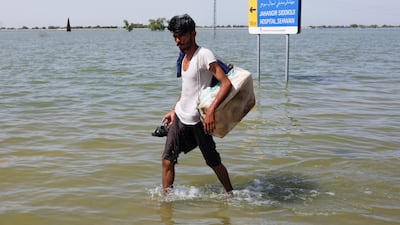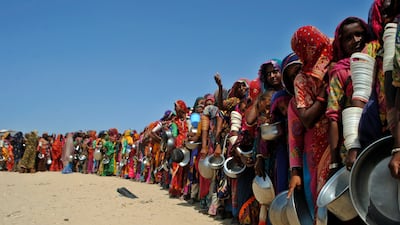Climate change is a battle for the future of the human species and this is still not being grasped by many people in the Middle East and North Africa, the UN’s top official in the UAE has said.
Dena Assaf, UN resident co-ordinator in the UAE, told The National that the average person may not realise the impact rising temperatures will have on them, their children or their grandchildren.
Speaking on Wednesday on the sidelines of the World Green Economy Summit in Dubai, Ms Assaf said people needed to ask themselves if they wanted the human species to become extinct. The Middle East, with its already scorching temperatures, is warming faster, scientists say, meaning more drought, heatwaves and water shortages.
UN resident co-ordinator in the UAE
“The impact of rising temperatures … is worse for us here,” she said. “People ask: ‘what has it got to do with me? That’s for the government or the UN to address'. But from the UN’s perspective, it is through collective action we make the difference.”
The urgency for action is clear. This year extraordinary heatwaves hit parts of the world. Temperatures exceeded 40ºC in the UK for the first time in history.
Extreme heat also affected countries including India, the US, Australia, Spain, Germany and China, while devastating floods inundated Pakistan. Scientists predict that these events will become more common and deadly.
“Today, I almost teared up a little bit in the venue looking at all the people and thinking to myself, 'in the end we are talking about the survival of our species',” Ms Assaf said.
“Earth doesn’t care and probably would be really happy. But do we want to keep our species alive?
“Do we want our future generations to be like these dystopian movies we watch where they live underground or in caves and become robot-like because the environment has become so polluted? If we don’t take care of our habitat we will become extinct.”
Over the next 18 months, two key climate change conferences will take place in the region. Cop27 will be held in Egypt in November, while the UAE hosts Cop28 next year.
At the UN General Assembly on September 20, Secretary General Antonio Guterres urged countries to uphold their climate pledges made under the Paris deal.
Agreed in 2015 and signed by about 200 countries, the Paris climate accord aims to limit global temperature rises to 1.5ºC, and to keep them “well below” 2.0ºC above pre-industrial levels.
At Cop26 in Glasgow last November, governments reiterated their commitment to keeping “1.5ºC alive.” But many say the countries are simply not moving fast enough.
“Having two Cops back to back in an area where [climate change] is not a joke means we could shift dialogue to a leadership role,” Ms Assaf said. “Do we want to be extinct like the dinosaurs? It is really about our species.”
But she sees signs of hope — particularly among youngsters — that the anti-environmental habits of old are being dispensed with.
“As humans, we have evolved,” said Ms Assaf. “We don’t live in caves any more. I think we are going through another evolutionary change where [environmentally unfriendly practices] we thought were acceptable are becoming unacceptable.
“In our lifetime, throwing a can out of a car used to not be a big deal. But not any more. It is a slow process but it represents a global revolution. If you have people moving in that direction of course it will make an impact.”
With only weeks to go before Cop27 takes place in Egypt, the two-day World Green Economy Summit in Dubai brings together experts, officials and ministers from several countries to drive the global sustainability agenda.
The conference in Sharm El Sheikh begins more than a year of intense regional activity that places the Arab World at the centre of protecting the world’s environment.
For Ms Assaf, the message is simple.
“You can be an agent for change within your circle of influence. Turn off the lights when you go to bed.”






















